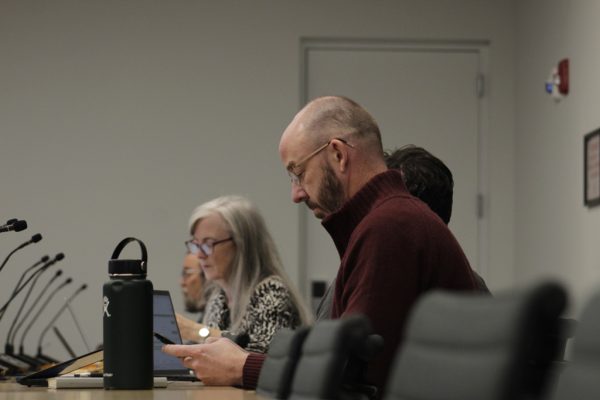Lerman strikes back
April 25, 2010
Zafra Lerman, former Columbia professor and head of the Science Institute, has filed a federal lawsuit against the college and four administrators, claiming the college violated her civil rights and deprived her of employment as a tenured faculty member of more than 30 years of service.
Lerman is seeking punitive and monetary damages in the amount of no less than $5 million.
In addition to Columbia, the eight-count complaint, filed on April 8, names as defendants Allen M. Turner, chairman of the Board of Trustees; President Warrick L. Carter; Steven Kapelke, provost and senior vice president; and Annice Kelly, vice president and general counsel.
College officials were unavailable for comment regarding the litigation due to a Human Resources policy that restricts them from commenting on personnel matters. The suit accuses the defendants of conspiring to terminate Lerman’s tenured employment without an opportunity for her to be heard before her peers on the Elected Representatives of the College Committee, which handles grievances involving tenured faculty members.
Laurel Bellows, of the firm Bellows and Bellows which is representing Lerman, told The Chronicle the main issue at hand is that Carter and Turner chose to ignore rulings found in favor of Lerman by the Elected Representatives of the College Committee.
“The removal of tenure without due process is inexcusable and that is what has happened in this matter,” Bellows said.
The Elected Representatives of the College Committee ruled in favor of Lerman on Dec. 21, 2009, stating “the efforts of the ERC in the Lerman case have been impeded by a lack of specificity in the reasons offered by the college for Lerman’s termination,” and that it “unanimously agrees that the college did not appropriately inform Lerman of the reasons for her termination as set forth in the Statement of Policies.”
In addition, in a letter dated Nov. 17, 2009, the American Association of University Professors had written Carter stating that Lerman’s termination went against Columbia’s own policies and also the recommended policies outlined by the AAUP for procedures for protection of due process and academic freedom.
Lerman was relieved of her position last Oct. 5 for allegedly misappropriating grant funds. Her lawsuit charges that her removal came after she expressed concerns to Kapelke about the statement by the American-Arab Anti-Discrimination Committee, or ADC, that deemed Columbia a “most serious discriminator” against Arab Americans.
The ADC accusation against the collegefocuses on its termination of part-time Columbia faculty member Suriya H. Smiley. The Chronicle reported in its Oct 12, 2009 issue that Smiley, who is of Arab descent, said she was allegedly fired without proper investigation when accused of making the anti-Semitic remark to one of her students, “I should have known you were Jewish by the size of your nose.”At the time, Lerman expressed support in favor of Smiley.
The lawsuit alleges that Columbia has a history of treating Jewish and female faculty less favorably than male faculty of the same descent in regards to sanction and dismissal.
The complaint explains that after an Aug. 25, 2009 statement from Lerman to Kapelke which objected to Smiley’s termination, she was interviewed by Columbia’s Human Resources Department. Lerman said she believed, at the time, that she was interviewed because of a complaint she filed against Ken Ilio, director of the Science Institute Research Lab, whom she believed was not doing the work and research he was hired for but still received payment of grant money dating back to 2007.
However, the suit claims this interview was part of an alleged investigation started by Kapelke in regards to Lerman’s competency to perform her duties, despite a positive performance evaluation which was conducted on April 29 of last year. The complaint states the investigation included faculty members that Kapelke allegedly understood to be personally antagonistic to Lerman.
In addition, an alleged second investigation was started by Kapelke in regards to claims that Lerman had purposely misappropriated grant fund payments made to Columbia, Ilio and other members within the Science Institute in 2007. According to the suit, the funds in question were allegedly authorized by Lerman upon consultation from Kapelke and Michael DeSalle, vice president of Business Affairs and chief executive officer.
“There are people responsible for grants,” Bellows said. “Faculty people don’t just make distributions. How is it that Lerman is making these transactions without any kind of guidance from the school? It just doesn’t happen.”
The complaint argues that as of October 2009, it was not within Kapelke’s jurisdiction as provost to conduct an investigation regarding reasons a tenured faculty member would be removed from her position at the college. Such investigations should have only been authorized by Carter as president.
Lerman, who at press time was on a lecture tour in Amsterdam, told The Chronicle in an April 22 e-mail that her alleged treatment by the college is surprising and called it sad that discrimination exists at an academic institution.
“The reaction in the U.S. and around the world is a shock in how the school treated me, ignoring any accepted rules and regulations in the academic world,” Lerman wrote. “Many presidents of universities and presidents of scientific societies are asking if Columbia is an academic institution. They claim they have never heard a story like that.”
Lerman added that the matter affects students as well.
“It is very sad for Columbia students who cannot celebrate all the awards that their work in my classes received, and will not have the opportunity to go for joint symposium at Princeton University or be invited to present in conferences on science visualization,” she said.
Kapelke issued a memorandum on Aug. 26, 2009, which allegedly omitted both his and DeSalle’s involvement in the guidance of Lerman regarding the misappropriated grant funds according to the suit. It also involved Turner for tenured faculty member’s disciplinary matters.
The complaint alleges that on July 2, 2009, Kapelke involved Carter, Kelly and the Human Resources Department in a “scheme” to protect the employment of Ilio against the concerns of Lerman.
The lawsuit states that Columbia fired Lerman in retaliation for her complaints concerning its alleged misuse of federal monies, and it said that in October 2009, the defendants tried to use their influence over the college to inhibit Lerman’s attempt to appeal her termination through the Elected Representatives of the College.
According to the complaint, Lerman filed a “Verified Charge of Discrimination and Retaliation” against Columbia. Allegedly, this led Kelly and Kapelke to terminate her employment, strip her of tenure rights, refuse to pay benefits during her appeal process, ban her from campus, renege on their commitment to compensate her for two years of sabbatical and to “ruin” the Malta Conferences.
The Malta Conferences are international conferences that seek to use science to help bring peace in the Middle East. Lerman is one of their prominent organizers.
Lerman’s suit invokes the U.S. Civil Rights Act in charging that the college discriminated and engaged in retaliatory conduct against her for her exercise of her rights, whereas the school has never punished similar employees in the same fashion.
Joel Bellows, who is Lerman’s lead council in the case, said Lerman’s allegations are a violation of civil rights that constitute actionable discrimination under the Equal Employment Opportunity
Commission regulations.
“This is an unusual case as discrimination cases go because Zafra is covered by her tenure rights,” Bellows said. “To fire someone or hassle them by starting two investigations is against her academic freedoms, which are guaranteed under the policies.”
Bellows said Columbia is treating tenured faculty members like non-tenured employees.
“To be a good faculty member, they have to have the ability to speak out on issues that are unpopular,” Bellows said. “They don’t only have the ability but the responsibility to speak out.”
According to the suit, Lerman received a letter from Kapelke following her filing of a complaint involving Ilio. The letter, dated Oct. 5, 2009, said, “reasons for your termination can be found in Section IX, A, 2, 4, and 7 [of Columbia’s Statement of Policy on Academic Freedom, Faculty Status, Tenure and Due Process]. As a result, your continued participation in the affairs of the college is likely detrimental and/or disruptive to the college.”
The federal complaint contends the letter did not accurately outline factual reasons for
her termination.
According to Columbia’s Statement of Policy on Academic Freedom, Faculty Status, Tenure and Due Process last updated on Oct. 1, 2009, it is the college’s responsibility to advise tenured faculty members of the reason for their termination in writing.
Columbia responded by letter on Dec. 14, 2009, stating it declined to make a response to AAUP’s allegations that Columbia did not follow the correct policies, but did not deny any charges outlined against them.
Carter then sent Lerman a letter on Feb. 4, 2010, stating he would “follow the ERC’s recommendation and state in writing that [Lerman] was terminated for misappropriating grant funds,” and he would uphold Kapelke’s decision to terminate her effective immediately.
The complaint contends that because Carter sent a termination letter in February stating her termination was effective immediately on that date, her previous termination by Kapelke was invalid, and that she was refused due process to fight for her position.
Carter is individually facing two counts against him along with Columbia.
One count states that Carter defamed Lerman last October, when he allegedly told staff members of the Illinois Congressional delegation in addition to unidentified members of the public that Lerman had “misappropriated government grant funds and engaged in improprieties with regard to grant funds.”
The suit says these alleged false statements may affect Lerman’s future employment prospects and caused her anguish, embarrassment and humiliation.
The second states Carter’s statements placed Lerman in a false light which would be highly offensive to a reasonable person.






